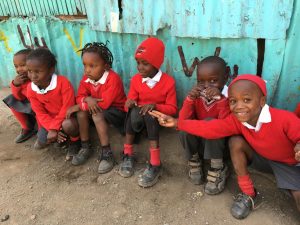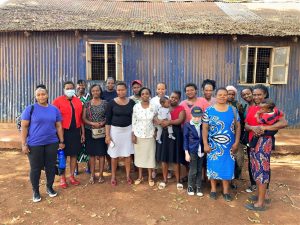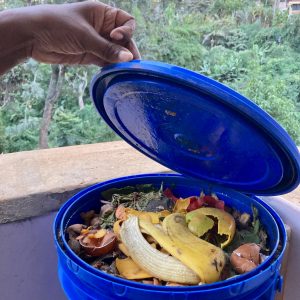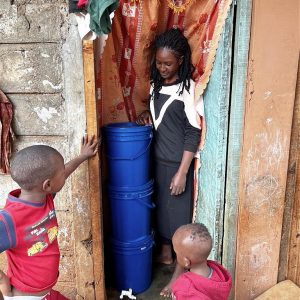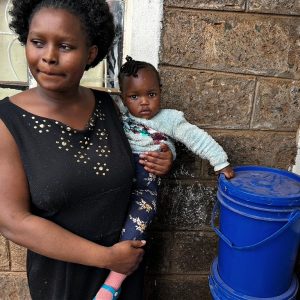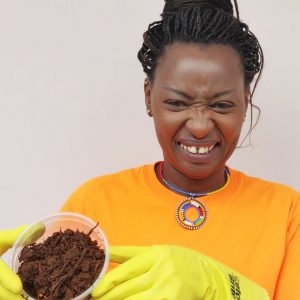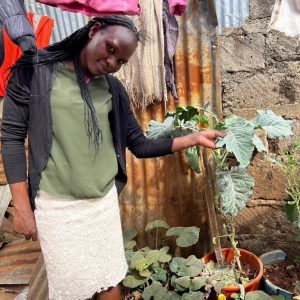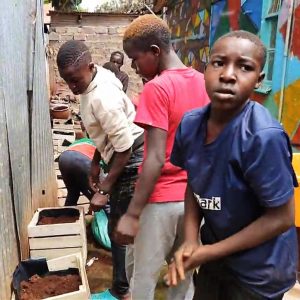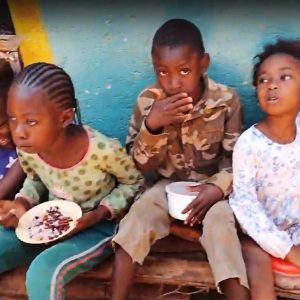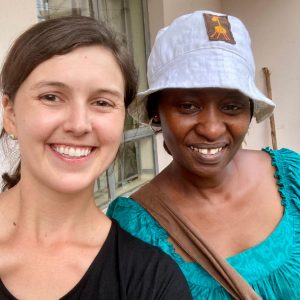ADVOCACYNET 392, February 13, 2023
Stella’s Composters Take Their Message to Schools in Kibera
After launching a composting revolution in the overcrowded settlement of Kibera, fifteen determined Kenyan women are taking their message – and their worms – into schools.
The move marks the latest step to reduce pollution and improve nutrition in Kibera by Shield of Faith, an association of mainly single mothers who use worms to compost food waste and produce a fluid fertilizer known as leachate. The group is seen below in the photo.
Three members of the team have spent the past month demonstrating their model to children at the Project Elimu, a popular after-school program that regularly attracts over 1,000 students from over 40 schools. They now plan a direct approach to schools in Kibera, which generate considerable amounts of food waste. Two schools have already expressed interest.
Stella Makena, the Shield of Faith coordinator, said her goal is to show children that protecting the environment pays dividends, even in crowded inner-city settlements like Kibera.
“Our message is that you can grow healthy food,” she explained in a phone call. “At the same time Mummy can save some money and buy good stuff.”
*
Shield of Faith was launched in 2020 with funding from The Advocacy Project (AP) to provide embroidery training for women from the Kibera and Kangemi settlements. After stitching stories about the pandemic and Kenyan wildlife, the artists formed two groups to address social problems.
The Kangemi Advocacy and Self-Help Group launched a community campaign that secured over 1,000 vaccinations against COVID-19.
In Kibera, Shield of Faith decided to tackle pollution and under-nutrition. Kibera generates over 230 tons of garbage a day and most produce is grown in sewage, contributing to a high level of stunting among children.
AP provided funding for a start-up that included scales to weigh the food waste composted. Ms Makena then designed composting bins from discarded plastic paint containers that could be stacked in kitchens. The group added Red Wriggler worms to speed up composting and produce leachate. These early successes were described in a news bulletin last April.
The program kicked into high gear at the end of last year and between September and December Shield of Faith composted 1.3 tons of food waste. Several members have erected kitchen gardens from abandoned plastic containers and are growing green vegetables and even strawberries.
Shield of Faith’s model attracted national attention in October when the group set up a demonstration kitchen garden at the annual fair of the Agricultural Society of Kenya and sold 124 liters of their worm leachate, which they have branded as Lishe-Grow (“Grow Nutrition”). Half of the proceeds – $186 – went to the women. The rest went into a group bank account.
Ms Makena featured on Kenyan television and was interviewed by The Organic Farmer, a magazine that goes out to thousands of enthusiasts.
The sales from Lishe-Grow provide a strong incentive but the group also remains true to its social mission. Six Shield of Faith members have children with albinism and been largely ostracized in their communities. They described their isolation through embroidery last year.
*
Schools offer a tasty target for the composters because the government provides a hot cooked meal every day that is the main source of nutrition for children from the poorest families. Many children overestimate the amount they can eat and this contributes to the waste, said Ms Makena.
Project Elimu offers a way into schools and Ms Makena has spent much of the past month with Vena Moige and Irene Okome, two founding members of Shield of Faith, constructing a kitchen garden at the Elimu center out of old plastic tubing and abandoned wooden shelves. The three women then trained over 300 children to plant seeds, add water and prepare for the harvest.
Ms Makena expects hundreds more children to join during the school holidays and will shortly introduce them to Red Wriggler worms. She is confident the two groups will bond because “kids love to handle creatures.”
Shield of Faith is also thinking of ways to appeal to students. One idea is to appoint “ambassadors” of composting. Ms Makena will also encourage older students who may be worried by climate change by pointing out that food waste in landfills produces methane gas, the most lethal greenhouse gas. Composting also allows plants and vegetables to turn carbon – the single largest cause of global warming – into nutrients.
Ms Makena is even considering introducing students to the notion of carbon credits, which allows producers of carbon to offset their emissions by paying for the reduction of a similar amount of carbon through other means, such as the planting of trees or composting.
While the amounts currently composted are tiny, her team hopes to compost almost 3 tons this year. If large schools were to come on board, the amount of carbon transformed would quickly grow.
*
Looking ahead, Ms Makena hopes to double the number of composters in 2023 and reach beyond Kibera to other settlements if funding permits. She also needs to find land for five Shield of Faith families that do not yet have gardens.
Shield of Faith is also looking to build North-South partnerships between high schools. Ms Makena has challenged AP to find schools in the US that will compost food waste. If a school is interested, we will offer to put the students directly in touch with the students in Kibera and let these future custodians of the environment learn from each other.
This bulletin was adapted from a recent report to GlobalGiving
* Contact us to volunteer or work with high schools in the US or Kenya
* Donate to Shield of Faith’s composting project
*

